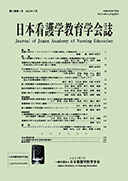
- |<
- <
- 1
- >
- >|
-
Yaeko MatsumotoArticle type: Review Article
1994Volume 4Issue 1 Pages 1-9
Published: March 01, 1994
Released on J-STAGE: April 01, 2022
JOURNAL FREE ACCESSDownload PDF (536K)
-
Keiko Murata, Fumie EmisuArticle type: Original Article
1994Volume 4Issue 1 Pages 11-18
Published: March 01, 1994
Released on J-STAGE: April 01, 2022
JOURNAL FREE ACCESSThis study examines nursing student' inferences about privacy needs of hospitalized patients, examines nursing students' attitudes toward patients' privacy, and examines relations among nursing students' inferences, attitudes, and their individual attributes that may have had an influence on their personal views of privacy. Data was collected from 185 nursing students at two junior colleges of nursing prior to graduation. A five point Likert scale ranging from "highly uncomfortable" to "not uncomfortable at all" was used for 57 questions as a measurement index for nursing studens' inferences about privacy needs of hospitalized patients. Another five point Likert scale ranging from "approve" to "disapprove" was used for eight cases which highlight eight core characteristics of privacy problems between nurses and patients as a measurement index for nursing students' attitudes toward patients' privacy. To determine individual attributes nursing students were questioned about experiences of living together with their family members and learning about privacy needs of patients.
On most of the 57 questions, most of the students inferred that patients feel "a little uncomfortable" or "fairly uncomfortable" in a hospital setting. They inferred that patients' needs would be rather high for "securing privacy for letting out personal emotions", "removing whatever invades personal space" and "keeping body and behaviors private", and that the need would be rather low for "keeping personal information private". Nursing students' attitudes showed the same tendency as their inferences about patients. The rate at which they responded "approve" to "keeping personal information private" was low. In their inferences about patients' needs, a significant difference was found between the students who had lived together with their family members and those who had not. In their attitudes toward keeping patients' privacy, a significant difference was found between the students who had learned about patients' privacy needs and those who had not.
View full abstractDownload PDF (402K)
-
Keiko Tajima, Hiromi Kiyokawa, Shihoko Nomura, Yukiko Toyoshima, Sum ...Article type: Research Reports
1994Volume 4Issue 1 Pages 19-34
Published: March 01, 1994
Released on J-STAGE: April 01, 2022
JOURNAL FREE ACCESSThe purpose of this study is to investigate life experiences, related nursing behaviors and other learning variables of nursing students on entering a baccalaureate college of nursing. Fifteen of the twenty baccalaureate colleges of nursing responded. There was responded rate of 774 (67.0% of fixed number) useable responses. Date was collected by written questionnaire developed by investigator in classrooms during orientation at the beginning of the academic year.
Variables include experiences with meal preparation, laundry, bed making, personal hygiene, interpersonal relations, leisure activities, study methods, and subject interests. Results include the following:
1)From their experiences, most students have a clear understanding of activities of daily living.
2)Many students have common senses in interpersonal relations and have had a experience as a volunteer.
3)Many students have a clear understanding and a positive attitude toward learning nursing skills, daily life needs, medical topics and living things.
View full abstractDownload PDF (792K) -
Mariko Koyama, Yumiko Oshima, Fumie Emisu, Toshiko Morita, Kesae Kasah ...Article type: Research Reports
1994Volume 4Issue 1 Pages 35-50
Published: March 01, 1994
Released on J-STAGE: April 01, 2022
JOURNAL FREE ACCESSA national curricula for nursing education was enacted throughout Japan in 1990.
The purpose of this study was to describe the processes and problems encountered by each nursing school in implementing the new curricula. The directors of the curriculum commitees of 827 nursing schools received a questionnaire by mail. Questions focused on the adoption of the national curriculum guidelines from the Ministry of Health and Welfare, changes in required lecture and clinical hours, and plans for the development of decision-making skills, knowledge application, and problem-solving skills.
There were 262 usable responses (32.3% response rate). The following results were demonstrated. 1) Most schools, except baccalaureate programs, followed the national curriculum guidelines when developng their own curriculum. 2) Compared to a former curricula, the number of lecture and clinical hours was decreased in many nursing schools, especially in diploma programs, as suggested. 3) Various efforts were being made to decrease school hours, yet there were different opinions on the use of students' free time. 4) Many schools were making efforts to further develop nursing student's abilities in the three areas of emphasis by using situational decision-making learning to unify student's knowledge. 5) The major problems in implementing the new curriculum were the teachers' problems, such as their lack of competency for change, problems related to curriculum contents and implementation, and problems unique to certain nursing programs.
View full abstractDownload PDF (786K)
-
T. Onodera, K. HatanoArticle type: Information
1994Volume 4Issue 1 Pages 51-60
Published: March 01, 1994
Released on J-STAGE: April 01, 2022
JOURNAL FREE ACCESSDownload PDF (510K)
- |<
- <
- 1
- >
- >|